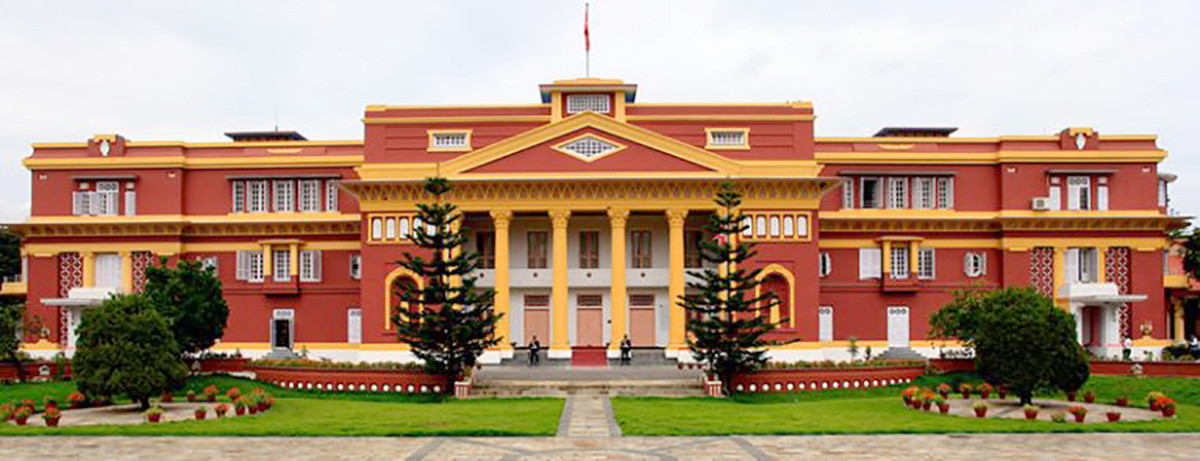CPN (Maoist Center) will play a decisive role as the main opposition Nepali Congress (NC) and CPN-UML look set to jostle in the presidential election scheduled for March 9.
There is provision of electoral college for presidential election where federal and provincial lawmakers are voters. Their votes, however, do not carry equal importance and federal and provincial lawmakers are given different weightage.
The 334 federal lawmakers including 275 House of Representatives (HoR) members and 59 National Assembly (NA) members are given weightage of 79 for each vote while the 550 provincial lawmakers are given weightage of 48.
The weightage of each federal lawmaker is calculated by dividing the total population of the country (as per 2011 Census) by the total number of lawmakers (333)—the constituency of Chitwan-2 is currently vacant after the Supreme Court (SC) ruled Rastriya Swatantra Party (RSP) President Rabi Lamichhane ineligible to become lawmaker due to the citizenship controversy—and dividing that number by 1,000.
The weightage of each provincial lawmaker is also calculated similarly replacing the total number of federal lawmakers with that of provincial lawmakers (550).
The total weighted votes for the upcoming presidential election is 52,707 including 26,307 for federal lawmakers and 26,400 for provincial lawmakers. The candidate receiving 26,354 weighted votes is elected the president.
If no candidate secures majority in the election, a runoff is held between the top two candidates.
NC has the largest share of weighted votes at 16,221 followed by UML at 15,233, Maoist Center 7,649, CPN (Unified Socialist) 2,574, RPP 2,450, Janata Samajwadi Party (JSP) 2,145, RSP 1,501, Janamat Party 1,242, Loktantrik Samajwadi Party (LSP) 971, and Nagarik Unmukti Party 813.
The total weighted votes of smaller parties and independent candidates is less than 1,000 but even that can be crucial considering there can be different permutations and combinations of alliances in the election.
Let’s look at the different permutations and combinations of possible alliances in the presidential election. If NC and Maoist Center were to stand together the total weighted votes add up to 23,870 taking them to just 2,484 short of victory. Support by Unified Socialist (2,574) alone would suffice for victory in that scenario.
The NC-Maoist coalition can secure victory even without support of Unified Socialist. It can do so with support of either of RPP or JSP or RSP, and a smaller party. The coalition can also secure victory without support of either RPP, JSP or RSP, and can get the necessary 2,484 votes with support of Janamat Party (1,242), LSP (971), and Nagarik Unmukti Party (813).
If UML and Maoist Center from the current ruling coalition were to stand together the total weighted votes add up to 22,882 taking them to 3,472 short of victory. Support of RSP and RPP—that are also in the ruling coalition—would suffice for victory even if Unified Socialist, formed after split of UML, does not decide to vote for the UML candidate.
But pro-monarchist RPP looks divided over whether to participate in the election for the republican head of state. The UML-Maoist coalition can still win with support of RSP and JSP or other different Madhes-based parties.
UML candidate, however, would struggle to secure victory without support of Maoist Center. UML must secure support of Unified Socialist if Maoist Center decides to support NC candidate. UML can secure victory with 26,882 votes with support of Unified Socialist, JSP, RPP, RSP, Janamat Party, Nagarik Unmukti Party and LSP. UML can secure victory even if one of Nagarik Unmukti Party or LSP does not support its candidate by mustering support of smaller parties like Nepal Workers and Peasants Party or Rastriya Janamorcha.
NC would also struggle to form a winning coalition without support of Maoist Center. It cannot secure victory even if it gets support from Unified Socialist, JSP, LSP, Janamat Party and Nagarik Unmukti Party as it will fall short by 2,388. It would still need support of RPP (2,450). Support of RSP and a few independent candidates can also suffice.
Maoist Center, in this way, looks set to be decisive in the presidential election, and both NC and UML would find victory a lot easier to secure with a coalition including Maoist Center.

